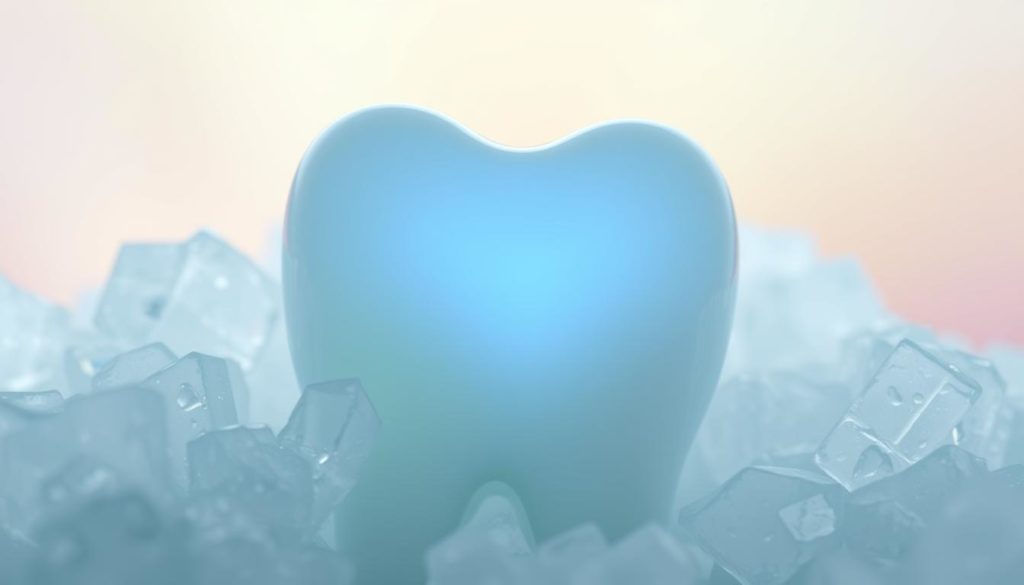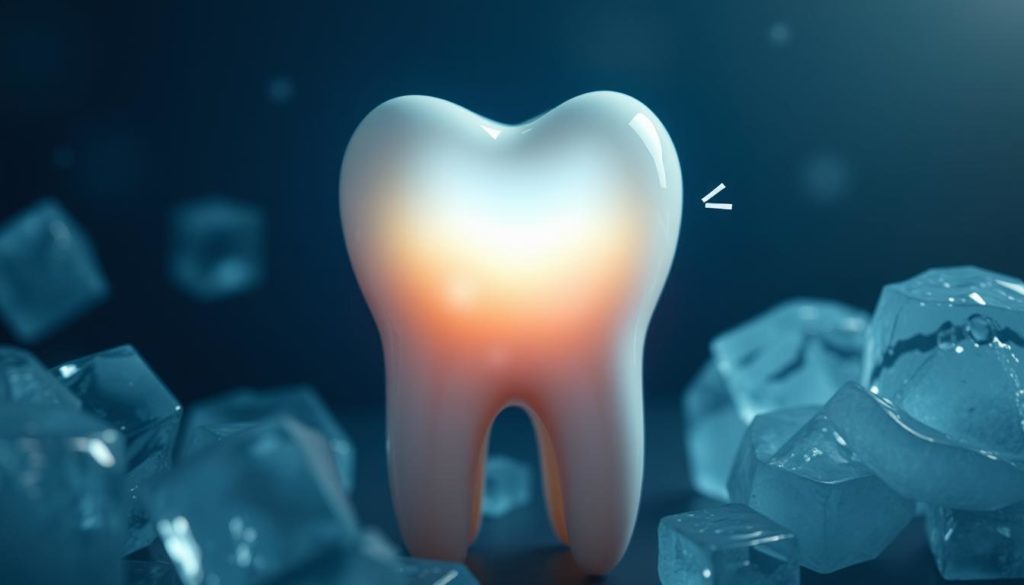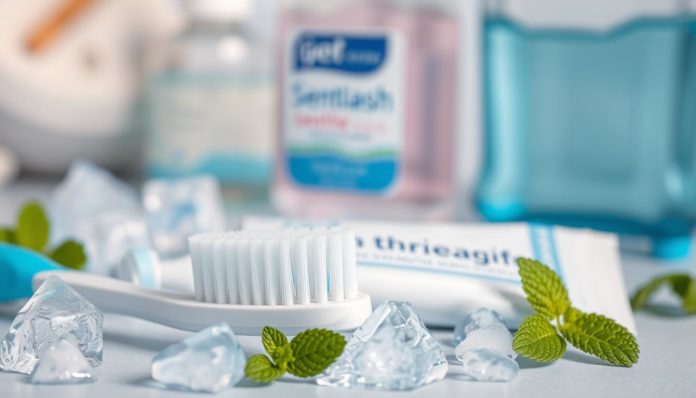Did you know nearly 40 million adults in the United States have sensitive teeth? This number shows how common the problem is. It can ruin your fun, like drinking coffee or eating ice cream.
Knowing about tooth sensitivity is the first step to feeling better. This guide will give you tips to ease the pain. You’ll learn how to avoid sensitive teeth and what symptoms to watch for. We’ll cover causes, prevention, and treatments.
Understanding Tooth Sensitivity
Tooth sensitivity is a common dental issue. It causes sharp pain or discomfort in your teeth. This happens when you eat or drink something hot, cold, sweet, or acidic.

What is Tooth Sensitivity?
Tooth sensitivity happens when the dentin layer of your teeth is exposed. This layer is under the enamel. When it’s exposed, it lets external stimuli reach the nerves inside your teeth. This can cause pain or discomfort.
Common Causes of Sensitive Teeth
There are several reasons why your teeth might become sensitive. Knowing these can help you find ways to fix the problem:
- Enamel Erosion: The enamel protects your teeth. It can wear down from hard brushing, acidic foods, or grinding your teeth. This exposes the dentin.
- Gum Recession: When your gums pull back, they can expose the roots of your teeth. These roots don’t have enamel, so they can be sensitive.
- Dental Procedures: Things like teeth whitening, fillings, or crowns can make your teeth sensitive for a while.
Identifying Sensitive Teeth Symptoms
Feeling pain in your teeth can really affect your day. It’s important to spot these signs early. This way, you can get the right treatment and care.

Signs of Sensitive Tooth Pain
Sensitive tooth pain feels sharp and sudden. It happens when your teeth meet certain things. Here are some common things that might make your teeth hurt:
- Hot beverages like coffee or tea
- Cold foods such as ice cream
- Sweet treats like candy
- Acidic foods including citrus fruits
These signs can change in how bad they are. If you often feel this pain, it could mean there’s a bigger issue with your teeth.
When to See a Dentist
Not all tooth sensitivity is a big deal. But if it keeps coming back or gets really bad, you need to see a dentist. Here are times when you should go:
- The pain doesn’t go away or gets worse
- It makes eating, drinking, or brushing your teeth hard
- You see signs of decay or gum problems
Ignoring these signs can lead to bigger problems. Like cavities or gum disease. Seeing a dentist early can help keep your teeth and gums healthy.
Causes of Sensitive Teeth
There are many reasons why teeth can become sensitive. This can happen due to what we eat or how well we take care of our teeth. Knowing what causes this problem is key to fixing it.
Dietary Factors
Some foods and drinks can hurt our teeth. Acidic foods like citrus fruits and soda can wear down the enamel. This exposes the sensitive parts inside the teeth. Sugary foods can also cause cavities, making teeth more sensitive.
- Acidic Foods: Oranges, lemons, pickles
- Sugary Products: Candy, sweetened beverages, pastries
- Cold Foods: Ice cream, chilled drinks
Dental Hygiene Practices
How we take care of our teeth matters. Brushing too hard or using a hard-bristled toothbrush can damage the enamel. Not flossing can also lead to plaque buildup, causing gums to recede and teeth to become sensitive.
Here are some habits to consider:
- Brush gently with a soft-bristled toothbrush.
- Use fluoride toothpaste to strengthen enamel.
- Regularly floss to remove plaque between teeth.
Medical Conditions
Some health issues can also make teeth sensitive. For example, GERD can wear down the enamel with stomach acids. Other conditions like bulimia and dry mouth can also damage the enamel. It’s important to treat these conditions to manage tooth sensitivity.
| Medical Condition | Effect on Teeth |
|---|---|
| GERD | Stomach acids erode enamel |
| Bulimia | Frequent vomiting wears down enamel |
| Dry Mouth | Lack of saliva leads to enamel deterioration |
Understanding the causes of sensitive teeth is crucial. This includes knowing how diet, dental care, and health conditions affect our teeth. By changing our habits and getting professional help when needed, we can better manage tooth sensitivity.
Daily Habits to Prevent Sensitive Teeth
Creating daily habits is key to avoiding sensitive teeth. Using the right brushing techniques and watching your diet are crucial.
Proper Brushing Techniques
Good brushing habits are vital for your teeth’s health and to stop sensitivity. Use a soft-bristled toothbrush to protect your enamel. Brush for two minutes, twice a day, to clean your teeth well without harming them.
- Use a soft-bristled toothbrush
- Brush gently to avoid wearing down enamel
- Ensure brushing for at least two minutes twice a day
- Replace your toothbrush every three to four months
Avoiding Acidic Foods
Reducing acidic foods is also important. Acid can wear down your enamel and make your teeth more sensitive. Here are some foods to limit:
- Citrus fruits like oranges and lemons
- Soda and other carbonated drinks
- Vinegar-based dressings and marinades
- Tomato-based products like sauces and ketchup
By following these habits, you can help keep your teeth from becoming sensitive.
Remedies for Sensitive Teeth
Dealing with sensitive teeth can be tough. But, there are many ways to find relief. You can try over-the-counter products, home remedies, or professional treatments. Knowing your options can help you find the best solution for your sensitive teeth.
Over-the-Counter Products
Over-the-counter products can really help with sensitive teeth. They often have ingredients like potassium nitrate and strontium chloride. These ingredients block pain signals from the tooth to the nerve. Some popular choices include:
- Desensitizing toothpaste
- Mouthwashes made for sensitive teeth
- Topical gels
Home Remedies
Home remedies can give you quick relief from tooth sensitivity. They might not last forever, but they work well for temporary relief.
- Saltwater Rinse: It helps cut down inflammation and bacteria in your mouth.
- Clove Oil: It has pain-relieving properties that can numb the area.
- Hydrogen Peroxide Rinse: It helps kill bacteria and soothe pain.
Professional Treatments
If home remedies and over-the-counter products don’t help, it’s time to see a dentist. Dentists have many treatments to help with sensitive teeth. They tailor their solutions to your specific needs.
| Treatment | Description |
|---|---|
| Fluoride Gel Applications | Strengthens tooth enamel and reduces sensitivity. |
| Dental Sealants | Protects the teeth by sealing exposed dentin. |
| Bonding Agents | Covers exposed tooth roots, providing a protective layer. |
It’s crucial to talk to your dentist to find the right remedy for your sensitive teeth. By exploring these options, you can find effective ways to ease pain and improve your dental health.
Choosing the Right Toothpaste
Finding the right toothpaste for sensitive teeth can change your life. It makes eating and drinking less painful. Let’s look at what to consider for your daily oral care.
Ingredients to Look For
Active ingredients are key in sensitive teeth toothpaste. Look for these:
- Potassium Nitrate: It soothes tooth nerves, reducing pain and sensitivity.
- Stannous Fluoride: It protects and remineralizes enamel, covering sensitive areas.
- Arginine: It seals dentin tubules, reducing sensitivity over time.
How Desensitizing Toothpaste Works
Knowing how desensitizing toothpaste works helps you choose better. They block pain or create a protective layer.
Potassium nitrate in toothpaste numbs tooth nerves, giving quick relief. Stannous fluoride creates a shield over dentin, reducing pain triggers.
Here’s a quick comparison of these benefits:
| Ingredient | Function | Benefit |
|---|---|---|
| Potassium Nitrate | Soothe Nerves | Immediate Pain Relief |
| Stannous Fluoride | Create Barrier | Long-term Sensitivity Reduction |
| Arginine | Seal Dentin Tubules | Prevent Sensitivity Triggers |
By thinking about these points, you can pick a toothpaste that meets your needs. This makes oral care more comfortable and enjoyable.
How Diet Affects Tooth Sensitivity
Eating well is key to managing tooth sensitivity. Knowing which foods to eat and avoid can greatly help. It can reduce pain and keep your teeth strong and healthy.
Foods to Eat
For a tooth sensitivity diet, focus on foods that strengthen enamel and lessen sensitivity. Include these in your meals:
- Dairy Products: Milk, cheese, and yogurt are full of calcium and phosphates. They’re great for tooth enamel.
- Leafy Greens: Spinach, kale, and other greens are packed with vitamins and minerals. They’re good for your teeth.
- Nuts and Seeds: Almonds and sunflower seeds are rich in protein and minerals. They’re good for your teeth.
- Crunchy Fruits and Vegetables: Apples, carrots, and celery clean your teeth while you chew. They’re also full of nutrients.
Foods to Avoid
There are foods to avoid for sensitive teeth as they can make things worse. Here are some to limit or avoid:
- Acidic Foods: Citrus fruits, tomatoes, and vinegar-based dressings can wear away enamel. This makes teeth more sensitive.
- Sugary Snacks and Drinks: Sodas, candies, and sports drinks can lead to plaque and decay. This causes sensitivity.
- Hot and Cold Foods: Foods like hot coffee and ice cream can cause pain in sensitive teeth.
- Sticky Foods: Caramel, dried fruits, and chewy candies stick to teeth. This increases the risk of decay and sensitivity.
| Recommended Foods | Foods to Avoid |
|---|---|
| Dairy Products | Acidic Foods |
| Leafy Greens | Sugary Snacks and Drinks |
| Nuts and Seeds | Hot and Cold Foods |
| Crunchy Fruits and Vegetables | Sticky Foods |
Choosing a mindful tooth sensitivity diet can greatly improve your oral health. It can also reduce discomfort from sensitive teeth.
Professional Tooth Sensitivity Treatment Options
Tooth sensitivity can be quite uncomfortable. But, there are several professional dental treatment options to help. Here are some of the most recommended treatments by dental professionals:
- Bonding: This involves applying a tooth-colored resin to exposed root surfaces. It offers protection and reduces sensitivity.
- Dental Crowns, Inlays, or Onlays: These are used to correct decay or structural damage. They cover the affected areas, preventing further sensitivity and offering long-lasting protection.
- Root Canal Treatment: If the sensitivity is due to nerve issues, a root canal may be necessary. This process removes the damaged or infected nerve, providing relief from severe tooth sensitivity.
Being proactive and seeking professional dental treatment can significantly reduce or eliminate tooth sensitivity. This allows you to enjoy a pain-free and healthy smile.
Maintaining Oral Hygiene for Sensitive Teeth
Proper oral care is key for those with sensitive teeth. By using certain techniques and making a few changes, you can keep your mouth clean and reduce pain.
Daily Brushing and Flossing Tips
People with sensitive teeth should use a soft-bristled toothbrush. This helps avoid making things worse. Brush in a circular motion, covering all surfaces but gently.
Choose toothpaste made for sensitive teeth to help lessen sensitivity. It’s designed to be kinder to your teeth.
Flossing is also crucial. It removes food bits stuck between teeth and along the gum line. Move the floss gently to avoid hurting your gums or making your teeth more sensitive.
Importance of Regular Dental Visits
Going to the dentist regularly is very important. Dental visits for sensitive teeth help a lot. They clean your teeth thoroughly, removing plaque and tartar that brushing and flossing might miss.
Dentists can also give you advice and treatments that fit your needs. They can help with your specific sensitivity issues.
Also, dental visits for sensitive teeth help catch problems early. This includes cavities or gum disease that could make sensitivity worse. Regular check-ups are vital for keeping your mouth healthy and your teeth strong.
Understanding Sensitive Teeth
It’s important to understand tooth sensitivity to manage its discomfort. By understanding tooth sensitivity, you can avoid triggers and keep your teeth healthy. Knowing how your teeth react to hot, cold, sweet, or acidic foods is key.
Identifying what makes your teeth hurt is the first step. If you feel sharp pain when eating, it’s a sign of a problem. Knowing this helps you choose the right products and habits to help.
Knowing how to prevent and treat tooth sensitivity is also crucial. Using desensitizing toothpaste and getting dental advice are important steps. By taking good care of your teeth and staying consistent with oral hygiene, you can live better and feel less pain.
Effective Long-term Solutions for Sensitive Teeth Relief
To find lasting relief from sensitive teeth, you need good dental care, lifestyle changes, and special dental products. By adding these to your daily routine, you build a strong base for long-term solutions. This helps keep your teeth and mouth healthy.
Begin with a thorough oral hygiene routine. Use a soft-bristled toothbrush and fluoride toothpaste for brushing. Don’t forget to floss regularly to avoid gum recession, which can make sensitivity worse. Also, regular dental visits are key to catch and fix any early problems.
Choosing the right dental products is also vital. Use desensitizing toothpaste to block pain signals to your teeth’s nerves. Mouthwashes made for sensitive teeth can offer extra protection.
Your diet is another important factor. Avoid acidic foods and drinks like citrus fruits and soda to prevent enamel loss. Eat more calcium-rich foods like dairy and leafy greens to strengthen your teeth.
With the right steps and commitment, you can better manage tooth sensitivity. By following these long-term solutions, you can enjoy better oral health. This means you can enjoy your favorite foods and drinks without pain.
FAQ
What is tooth sensitivity?
Tooth sensitivity is when your teeth hurt when you eat or drink something cold or hot. It happens when your enamel gets thin or your gums pull back.
What are common causes of sensitive teeth?
Sensitive teeth can be caused by many things. This includes thinning enamel, gum recession, tooth decay, and cracked teeth. Grinding your teeth or going to the dentist can also cause it. Foods and drinks that are acidic or sugary can make it worse.
What are the signs of sensitive tooth pain?
If your teeth hurt when you eat or drink something cold or hot, that’s a sign. It can also hurt when you brush or floss.
When should I see a dentist for sensitive teeth?
See a dentist if your tooth pain doesn’t go away or is very bad. They can check for cavities or gum disease that need treatment.
How can dietary factors affect tooth sensitivity?
What you eat can really affect your teeth. Acidic foods can wear away your enamel. Sugary foods can lead to cavities, making your teeth more sensitive.
What are some proper brushing techniques to prevent sensitive teeth?
Use a soft-bristled toothbrush and brush in circles. Don’t brush too hard, as it can hurt your gums. Brush for two minutes, twice a day.
What are some over-the-counter products for sensitive teeth relief?
You can find toothpaste and mouthwash that help with sensitive teeth. Look for products with potassium nitrate or stannous fluoride.
What home remedies can help with sensitive teeth?
Try rinsing with saltwater and avoid acidic foods. Use a soft toothbrush and fluoride mouthwash. Good oral hygiene helps too.
How does desensitizing toothpaste work?
Desensitizing toothpaste blocks pain signals to your nerve. Ingredients like potassium nitrate and stannous fluoride create a barrier, easing pain over time.
What foods should I eat to strengthen my teeth?
Eat foods rich in nutrients like dairy, leafy greens, nuts, and lean proteins. They give your teeth the calcium and phosphorus they need.
What foods should I avoid with sensitive teeth?
Stay away from acidic and sugary foods. They can erode your enamel and make your teeth more sensitive.
What professional treatments can help with tooth sensitivity?
Dentists can apply fluoride gel, use dental sealants, or bond your teeth. In severe cases, a root canal might be needed.
How important are regular dental visits for managing sensitive teeth?
Regular dental visits are key for managing sensitive teeth. Dentists can clean your teeth, check for problems, and suggest treatments.


